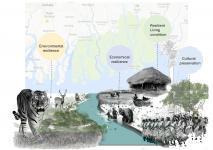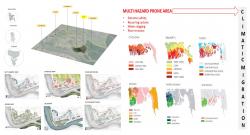The forest-based Munda community is one of Bangladesh's many tribal communities, having their age-old
religion, culture, customs, language, and knowledge, for which they are recognized as a unique group of people with different tribal traits. Originating in India, some of the Munda people travelled to Bangladesh around 300 years ago and have been living here ever since. Despite of their rich tradition and heritage, the Mundas are one of Bangladesh's most despised and disdained ethnic groups. Moreover, Mundas living in the Kalinchi village in the Sundarbans’s ecological zone, one of the country's most vulnerable locations, are facing major challenges from saline intrusion, tropical cyclones, storm surges, and what not.
In order to protect both this ethnic community and the Sundarbans, the intension to create a self-sustaining community by introducing low-cost housing solutions that are specific to hazards, creating alternate income opportunities, and promoting their culture with the help of their indigenous knowledge
• Enhance their financial, educational, and cultural self-sufficiency and clear the way for self-realization.
• The micro, meso, and macro levels of policymaking.
• Sharing their culture with the general public.
• Investigating durable home features with the use of their ancestors' knowledge.
• Adopting ecologically friendly measures at all levels.
By strengthening their ability to withstand natural calamities, creating new chances for employment, preserving their cultural identity, and protecting the Sundarbans, this project can assist this ethnic community in becoming self-sufficient. The primary concerns facing this indigenous community will be addressed by architectural interventions, which will be the subject of this study.
2022
Cost-effective, locally sourced, sustainable materials were employed. To minimize damage in the event of a structural collapse during risks, lightweight materials
Student : Pallabi Dutta
Supervisor : Dr.MD. Mustafizur Rahman






